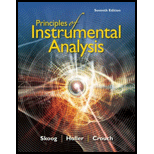
Principles of Instrumental Analysis
7th Edition
ISBN: 9781305577213
Author: Douglas A. Skoog, F. James Holler, Stanley R. Crouch
Publisher: Cengage Learning
expand_more
expand_more
format_list_bulleted
Question
Chapter 30, Problem 30.8QAP
Interpretation Introduction
Interpretation:
Theadvantage of micellar electrokinetic capillary chromatography over conventional liquid chromatography needs to be explained.
Concept introduction:
Micellar electrokinetic capillary chromatography or MECC is modified form of capillary electrophoresis wherein the samples are separated by partitioning the micelles and buffer solution. Micelle are a group of 40 and above surfactant molecules wherein the hydrocarbon tail points inward while the negative charged head point outwards.
Conventional liquid chromatography involves mobile phase which is liquid that is carried out in column or plane.
Expert Solution & Answer
Want to see the full answer?
Check out a sample textbook solution
Students have asked these similar questions
Name the major organic product of the following action of 4-chloro-4-methyl-1-pentanol in neutral pollution
10+
Now the product. The product has a molecular formula f
b. In a singly hain, the starting, material again converts into a secule with the molecular kormula CIO. but with
comply
Draw the major organic structure inhalation
Macmillan Learning
Alcohols can be oxidized by chromic acid derivatives. One such reagent is pyridinium chlorochromate, (C,H,NH*)(CICTO3),
commonly known as PCC. Draw the proposed (neutral) intermediate and the organic product in the oxidation of 1-butanol by
PCC when carried out in an anhydrous solvent such as CH₂C₁₂.
PCC
Intermediate
OH
CH2Cl2
Draw the intermediate.
Select Draw Templates More
с H Cr
о
Product
Draw the product.
Erase
Select Draw Templates More
H
о
Erase
If I have 1-bromopropene, to obtain compound
A, I have to add NaOH and another compound.
Indicate which compound that would be.
A
C6H5 CH3
Knowledge Booster
Similar questions
- Provide the reagents for the following reactions.arrow_forwardIf I have 1-bromopropene, to obtain compound Z, I have to add two compounds A1 and A2. Indicate which compounds are needed. P(C6H5)3arrow_forwardDraw the major product of this reaction. Ignore inorganic byproducts. Assume that the water side product is continuously removed to drive the reaction toward products. O CH3CH2NH2, TSOH Select to Draw >arrow_forward
- Indicate the products obtained by reacting fluorobenzene with a sulfonitric mixture.arrow_forwardIf I have 1-bromopropene, to obtain compound A, I have to add NaOH and another compound. Indicate which compound that would be. C6H5 CH3arrow_forwardIf I have 1-bromopropene and I want to obtain (1,1-dipropoxyethyl)benzene, indicate the compound that I should add in addition to NaOH.arrow_forward
- Draw the major product of this reaction. Ignore inorganic byproducts. Ο HSCH2CH2CH2SH, BF3 Select to Draw I Submitarrow_forwardFeedback (7/10) Draw the major product of this reaction. Ignore inorganic byproducts. Assume that the water side product is continuously removed to drive the reaction toward products. Incorrect, 3 attempts remaining Ο (CH3CH2)2NH, TSOH Select to Draw V N. 87% Retryarrow_forwardIf I want to obtain (1,1-dipropoxyethyl)benzene from 1-bromopropene, indicate the product that I have to add in addition to NaOH.arrow_forward
arrow_back_ios
SEE MORE QUESTIONS
arrow_forward_ios
Recommended textbooks for you
 Principles of Instrumental AnalysisChemistryISBN:9781305577213Author:Douglas A. Skoog, F. James Holler, Stanley R. CrouchPublisher:Cengage Learning
Principles of Instrumental AnalysisChemistryISBN:9781305577213Author:Douglas A. Skoog, F. James Holler, Stanley R. CrouchPublisher:Cengage Learning EBK A SMALL SCALE APPROACH TO ORGANIC LChemistryISBN:9781305446021Author:LampmanPublisher:CENGAGE LEARNING - CONSIGNMENT
EBK A SMALL SCALE APPROACH TO ORGANIC LChemistryISBN:9781305446021Author:LampmanPublisher:CENGAGE LEARNING - CONSIGNMENT

Principles of Instrumental Analysis
Chemistry
ISBN:9781305577213
Author:Douglas A. Skoog, F. James Holler, Stanley R. Crouch
Publisher:Cengage Learning


EBK A SMALL SCALE APPROACH TO ORGANIC L
Chemistry
ISBN:9781305446021
Author:Lampman
Publisher:CENGAGE LEARNING - CONSIGNMENT